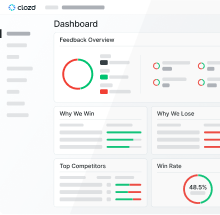
Many B2B marketers get stuck focusing too much on delivering a high volume of leads that they put initiatives that would build brand strength and reputation on the backburner. Unfortunately, this myopic focus can have severe consequences for the success of your company.
I've experienced this myself at a previous startup. The desperation to scale leads due to a short runway and the high expectations placed on this VC-backed startup meant we obsessed over the number of leads and opportunities detrimentally to the brand. Building the brand's strength and reputation became secondary. Our mindset led to initiatives that created leads but lowered win rates and didn't create demand for our product. It was relatively easy to push a piece of content on Facebook and generate hundreds of leads. However, so few of these leads turned into a deal, and we never got to a place of brand strength and reputation.
Looking back on this experience, I've realized we didn't see many of the benefits that a company with incredible brand strength and reputation enjoys. Playing the short-term lead game made us miss out on the amazing halo effects of a solid brand. I learned from that experience and have made a concerted effort to understand brand strength and reputation more. Part of that learning has been analyzing the thousands of buyer interviews we've done for companies. Here are some of my takeaways from that analysis on how brand strength and reputation help your company win more.
Thought Leader
People like being part of a winning team. If you don't believe me, there is an actual word that describes it, bandwagon. Over and over again, we see considerable swings in fanbases when a new winner emerges. Take the Golden State Warriors, for example. In 2013 they ranked as the 18th most popular NBA franchise on Facebook with 400,000 likes. At the time, the average was 2 million. Four years and one championship later, the Warriors were the fourth most popular team in the league. Their Facebook followers had grown 2,500% to 10.4 million (league average was 156% growth).
Positioning your brand as the thought leader in your category will give you similar results. Buyers will feel like they are winning by joining with you and purchasing your solutions. They are now part of the bandwagon, the winning team. We see this a lot in our buyer interviews. When the brand positively influenced a deal outcome, buyers say things like, "They are a thought leader. They have brought a lot of new concepts into the industry. They are innovators, not only the technology but from a leadership perspective. They have done a lot for the industry."
Trust
When a buyer trusts your brand more than the competition, you are one step closer to winning. This trust can mean a lot of different things to buyers. They worry about things like if your company will be around long enough for an investment to make sense, can your company take care of them when trouble arises, is your solution capable of solving their problem. With software especially, buyers are concerned if your solution is reliable and secure. Will it be there when they need it most? Does this open us up to a security liability? These are common trust questions asked by software buyers. For example, a buyer in our interview data said this about trust, "A new employee wanted to buy a 7 figure tool that was unfamiliar to us. Once we realized the tool was from this well-known brand, my team felt comfortable that it was an organization we could trust. For my leadership team, it was validation that the tool met our needs simply because of brand recognition."
Empathy
B2B buyers want to know that you understand them and the problem they are trying to solve. We see brand strength influence this when a brand positions itself as the best practitioner in the buyer's world. It ties into Thought Leadership tightly. Content can play a massive role in establishing your brand as a voice in your buyer's world. Doing that content from a thought leadership point of view is even better. Buyers won't just think you understand them and their problem; they will see that you understand it even better than they do.
Solution Becomes a Core Skill
One of my favorite effects of building a strong brand that defines a category is that your solution turns into a required skill on resumes. Sometimes it will even create jobs itself. Some great examples of this are social platforms, cloud computing platforms, software suites, and more. I'm not saying a strong brand will give you this impact alone. You may need a product that completely creates and dominates a category through a new way of doing things. Buyers think about this though in their evaluations. This is what one buyer said in our interviews, "One of my more selfish reasons for pushing this purchase through is because this product is the gold standard, right? I feel very selfishly if I can say I know this product. That is a skillset that I need to have on my resume as a marketer. It's an easier sell if I ever go to another place."
Word of mouth
If you are still worried about leads, this is another superpower of brand strength, people selling your solution for you. In my opinion, the most successful channel for marketing is word of mouth. Strong and identifiable brands that are amazing at the things I've talked about above get to enjoy word of mouth the most. The funny thing is most b2b marketers don't have a solid plan in place to drive this channel. It gets deprioritized because it is really difficult to measure.
Increased Win Rate
Don't forget that marketing should increase win rates. It is not just a lead generation activity. I'm not just talking about increasing win rates by making sure the right leads come through your channels. These things are important, but what I really mean is that marketing should be actively working on a brand's strength and reputation to win more deals and drive revenue.
How can win/loss analysis help?
A big piece of brand strength and reputation is understanding what your buyer's perspective of your brand is. Not what you think their perspective is, but what it is from their own mouth. Once you have that perspective, you can create a plan to lift your brand's strength and reputation. You'll be able to correct misconceptions about your brand or make strategic changes within your company to improve buyer perception. Clozd focuses win/loss analysis programs around buyer interviews. Our talented team of consultants interview your buyers on won and lost deals. This interview data is then presented in our platform, where stakeholders from your company can find these buyer perspective insights. You'll better understand your brand's strength and reputation in the market and create customer-centric plans for positioning your brand the right way.











.svg)


.jpg)







.svg)

.svg)




